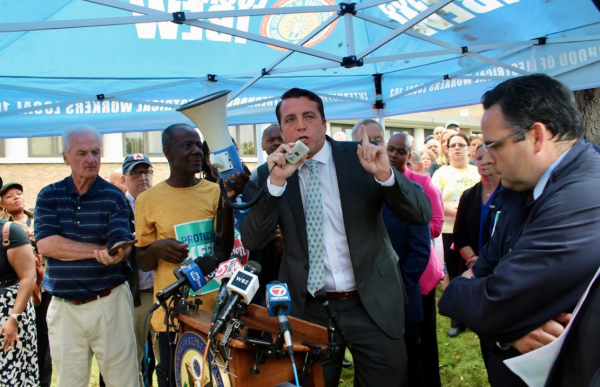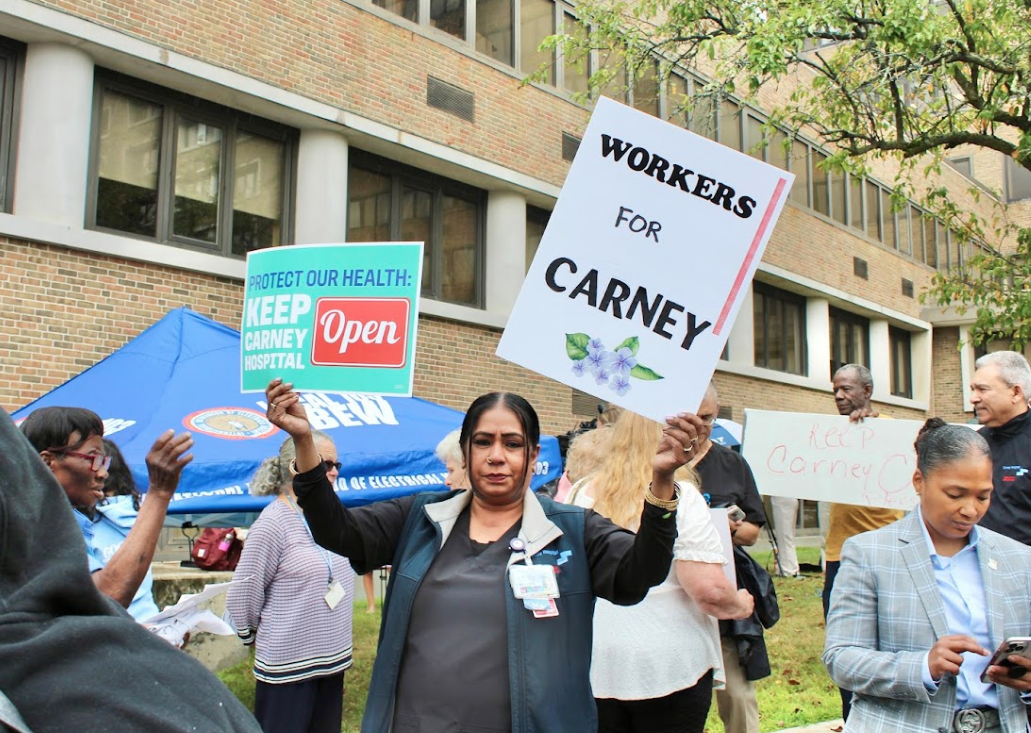July 30, 2024

Councillor John FitzGerald at the Monday rally: "Trust me, we know we've got 31 days, and we're working hard. This is the priority." State Sen. Nick Collins is shown at right. Cassidy McNeeley photo
Is there any hope that Carney Hospital might stave off a date with the locksmiths and keep the lights on past Aug. 31? The likelihood of a reprieve diminished greatly on Monday after Gov. Healey said that while there was “nothing” she could do to deter Steward from closing Carney and another of its hospitals in the middle of the state, she could help Steward as its transitioned other hospitals in its Massachusetts orbit to new owners with $30 million in state subsidies.
For their part, other influential political leaders have left the door open – even if just a crack – to using other tools, not yet deployed, to compel Steward and its creditors to take a different route with their bankruptcy moves. Most have called on state officials to enforce a strict interpretation of existing law and insist that Steward keep Carney open for an additional two months at minimum.
State Sen. Nick Collins has emerged as the chief proponent at the state level of alternate actions to prevent a Carney closure. He was one of about a dozen elected officials who spoke at a Monday rally held on the edge of Carney’s Dorchester Avenue campus that drew about 200 workers, patients, neighbors, and union organizers.

Padma Singh, an emergency room medical assistant at Carney Hospital, held up signs during a rally outside the Dorchester Avenue facility on Monday. “It was such a slap in our face that Steward did all of this to us,” said Singh, who has worked at Carney for 25 years. “It's not easy for the community of Dorchester where we serve the underprivileged people, where are they going to go for health care?” Cassidy McNeeley photo
“I support any and all [steps], including extraordinary action in the form of a state of emergency at the state and city level to keep the Carney open,” said Collins, who added that he wants state legislation passed to give the Department of Public Health receivership power to “provide funding to keep Carney open with enough time to provide for a qualified bidder.”
City Councillor John FitzGerald, who delivered the most impassioned speech of the day, said he thinks there’s still a fight worth having that could result in the facility staying open and keeping Carney’s 750-plus person workforce in place.
“There are deals on the table they’re not taking because of greed. And there is a way to make this hospital still functioning, successful, and profitable, but when you mix profit and care, all you care about is the profit,” said FitzGerald.
“People are asking what the plan is,” he noted. “I’ve been working with my [fellow] electeds on the federal, state level — me and Senator Collins have been on the phone all weekend— trying to figure out what we can do.” He added: “This is not the place to discuss it — I apologize for that— but we are working with all the tools that we have.”
Said Collins: “You can't have a hospital send $25 million in annual rent payment to a parent company that says they operate on a $14 million loss when they bought the property for half of that. That's disingenuous and it's wrong, and if it weren't for this case, we wouldn't be here today.”
Later on Monday, Councillor Ed Flynn joined FitzGerald in calling for the Boston City Council to pass a resolution to “declare a public health emergency in relation to the closure of Carney Hospital, and to take all possible steps necessary to preserve the operations” there. The resolution also “urges the City of Boston and State Government to be prepared that if there are no bidders for Carney hospital, to seize the property by eminent domain and to continue to operate the facility until a permanent operator is found.”
On Tuesday, a spokesperson for Mayor Wu said she was still reviewing the Flynn-FitzGerald resolution, which the council is expected to discuss at its Aug. 7 meeting.
“We have called for the full 120-day transition planning process provided for by state law so that the City of Boston can work with community, unions, elected officials, and all stakeholders to explore all paths forward for Carney Hospital, patients, residents, and workers,” said the spokesperson. “At first review, an emergency declaration at the local level would not create any new authority or financial resources, but the City remains open to exploring any opportunity to best serve community members."
Wu spoke at Monday’s rally outside Carney and expressed outrage and “frustration” at the Steward decision, but stopped short — like most other political leaders who spoke— of pledging to halt the hospital’s closing.
But sources close to the mayor suggest she has not fully closed the door on a possible alternative to a complete closure. Labor and other elected officials say Wu will convene a meeting on Friday to explore what’s possible.
At the rally, she said: “We will figure out a way together” while noting that “what makes the situation all the more frustrating is that this closure has nothing to do with this neighborhood or this location, the patients, the workforce, or the community. It has everything to do with the facts that Steward Healthcare and its executives and investors pulled hundreds of millions of dollars out of this hospital system, deliberately running the facilities and staff into the ground for their own personal gain.”
US Rep. Ayanna Pressley sounded a similar note in her speech, in which she lambasted Steward executives for their greed and “reckless financial decisions and a blatant disregard for the health and wellbeing of our community.”
She added: “For our residents who are wondering ‘What comes next’ know that we stand with you every step of the way and we are going to fight like hell. We'll use every tool available to us to hold Steward accountable. We will legislate to reign-in private equity and fix our broken healthcare system that puts profit over people and we will organize and we will mobilize to build a just America that affirms healthcare as a human right and prevents crises like this from ever happening again.”
US Rep. Stephen F. Lynch called the closure announcement “a real kick in the gut to the Dorchester neighborhood and surrounding neighborhoods. This announcement is in violation of state law, state regulations and, and federal law, he said. “They're supposed to provide a formal notice 90 days out from a hearing, a public hearing where information would have been delivered to the neighborhood, giving us a sense of what options we have.”
He added: “So we are gathered here today to push back on this effort to close Carney Hospital. We want the full rights that are entitled to these, neighbors, these families, these employees, these patients.”
US Sen. Ed Markey, who has issued a subpoena to force Steward’s CEO Ralph Della Torre to testify before a Congressional committee in September, emphasized the need to prevent future corporate raiders and asserted three key demands of his own.
"First, I am demanding that the court mandate Steward Health Care comply with the legal requirements for hospital closures. They must engage in the full and robust process that includes community notice and participation. Second, I'm calling on the court to reduce and restructure the hospital leases with Medical Properties Trust that are tying these hospitals to unaffordable rents every single day. And third, I'm calling upon the private equity and real estate creditors to direct any revenue from the hospital sales toward the commonwealth's health care system."
For his part, state Rep. Daniel Hunt told The Reporter on Monday that he hopes to keep at least an emergency department— and other essential facilities at the Carney campus— open in some form.
On Tuesday, Collins told The Reporter that he has urged Kate Walsh, the Secretary of Health and Human Services under Gov. Healey, “to support legislation currently before the Legislature to give the Department of Public Health receivership power and funding to keep Carney Hospital open long enough to land a qualified bidder.”
He added: “Continuity of operations is critical to providing safe access to care and keeping leadership and staff intact. Shutting off access for the over 30,000 ER visits per year alone would be the definition of a state of emergency for a health care system currently facing an acute care crisis.
Collins believes that Healey and Wu both have powers under state law to have the Carney operate under state or city authority until a new operator can be put in place.
Topics:


